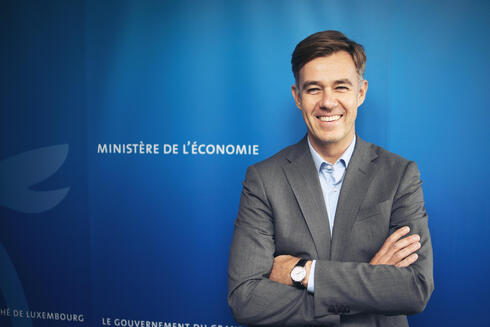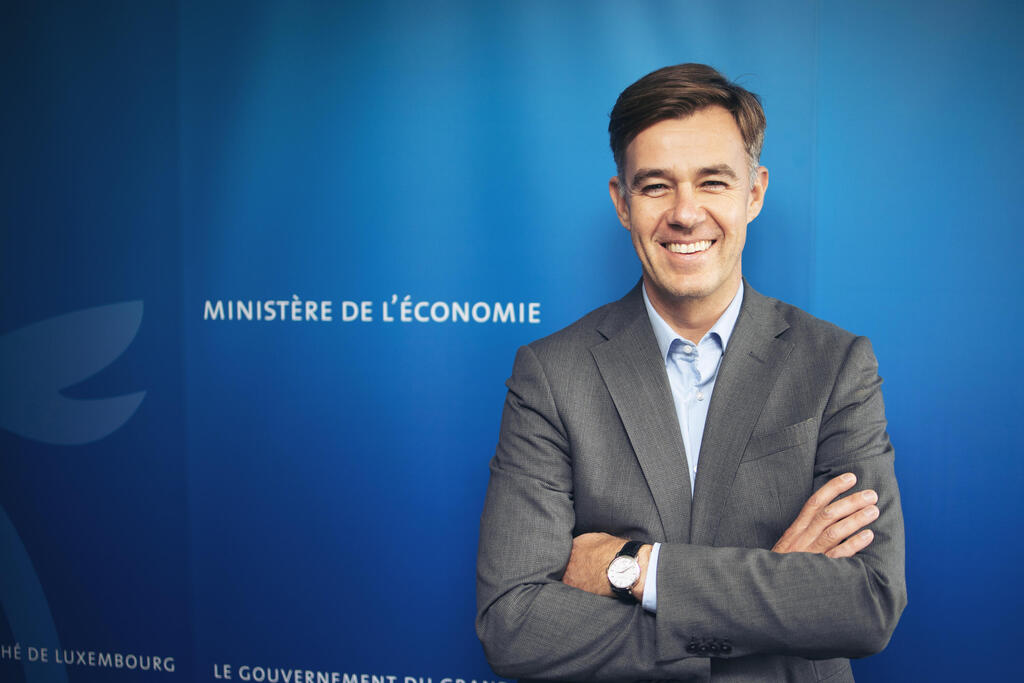
“Global players of all sizes use Luxembourg as a gateway to Europe and beyond”
With its flourishing and dynamic economy, Luxembourg presents itself as a particularly attractive international hub in the heart of Europe. Franz Fayot, Minister of the Economy, talks about the country’s strengths and his vision for the future.
How would you describe Luxembourg and its economy to economic actors who know little or nothing about the country? And why should international players willing to invest in Europe pay attention to Luxembourg? What opportunities can they see?
Franz Fayot: Over the past decades, Luxembourg has made its mark internationally as a reliable and innovative partner. The country is best described as a world-renowned international business location, a secure and reliable hub for cross-border activities in a number of fields, including key high-tech sectors like space or automotive. Global players of all sizes use Luxembourg as a gateway to Europe and beyond, benefiting from its closeness to decision-making centres and its excellent access to worldwide markets. International companies are also attracted to Luxembourg because they value the country’s sound macroeconomic foundations and the stable political environment.
What are the major challenges, risks and opportunities related to the country’s economy?
Luxembourg has been committed to green transition and the digital transformation, even long before the pandemic and the associated economic crisis of 2020. Sustainable growth is an essential aspect of our economic development and diversification policy. Considering the lessons learned from the pandemic and looking at global trends, it is obvious that the path we are already on is the right track to follow. Across all sectors, decarbonation, sound use of resources, circularity and digitalization are key. Of course, we also identified some other important challengees to make the economy more resilient to a crisis: these include the reindustrialization of Europe, especially the need to protect our manufacturing industry from lower quality and from more CO2 intensive products imported from third countries, and aiming for a stronger internal European market. The COVID-19 crisis has also highlighted the urgent need to design smarter, stronger and more diverse supply chains that are resilient and can withstand crises.
Today, the economy must change, evolve towards sustainable models. How is Luxembourg accompanying this transition, with what ambitions?
Our country is ideally positioned to accelerate its transition while coming out of COVID-19 and to relaunch and further modernize its economy. Luxembourg is providing an ideal business environment for combining successful economic development with long-term sustainability. At the ministry of the Economy, we developed a roadmap called “Our economy of tomorrow” to accompany the transformation of the Luxembourg economy by 2025. The roadmap addresses the industrial innovation policies, regulations, financial instruments and actions necessary to support the rapid emergence of a competitive, resilient and sustainable economy. We have for instance implemented a new aid measure for companies that have suffered the impact of the COVID-19 crisis. By means of subsidy levels of up to 50%, this aid encourages firms to carry out economic development, digitalization and environmental protection projects. An additional level of subsidy is awarded for projects that include a circular economy aspect.
How is the strategy for transforming the industry, based on the conclusions of the Rifkin process, taking shape?
The Rifkin process was conducted in 2016 to support Luxembourg’s ecological and digital transition that was already ongoing at that time. The reflections carried out during this participatory process subsequently contributed to the orientation of the country’s economic policy towards more sustainability.
We have broadened the initial perspective of this process because the current context has changed: the pandemic has revealed certain vulnerabilities in society and the economy, and the megatrends identified through the Rifkin process have accelerated significantly with the pandemic. In addition, new international and EU obligations have arisen from the challenges posed by climate change, with the aim of drastically reducing greenhouse gas emissions. The resilience of the economy and society has thus become another key issue. Luxembourg Strategy, the foresight unit of the Ministry of the Economy, was established at the end of 2020 in order to continue and extend the collaborative process for transforming the economy initiated in 2016 with the Rifkin process. Through foresight and different modelling and planning initiatives, this unit supports the transformation of the national economy to make it more sustainable and more competitive.
Luxembourg’s economy was built on the steel industry, then on the development of financial activities. How is it seeking to diversify today?
Luxembourg is a country in a constant state of transformation, having reinvented itself in a changing world more than once. So does its economy. Throughout its history, Luxembourg has evolved from an agricultural country first to an industrial state, and later to a world-renowned financial business centre. These days, another transformation is underway, backed by an economic diversification programme that places particular emphasis on innovative technologies in various fields, including clean technologies, smart mobility, health technologies, space and logistics. Many international groups have set up their global or European headquarters, R&D centres and other operations here. The Ministry of the Economy invests considerable effort to support these entrepreneurs developing innovative activities from Luxembourg.
How do you see the Luxembourg economy developing in the future?
Both digitalization and circularity will contribute to the further diversification of the economy, as drivers for the sustainable transition. Luxembourg’s integrated ecosystem is an important enabler of the implementation of a circular economy that will increase the overall efficiency of our national economy and reduce its ecological footprint. Today Luxembourg is already a high-tech centre of excellence. Since many years, digitalization takes a predominant role in the development of our economy. In the short and midterm, we aim at consolidating our position as the most progressive and attractive environment in the EU for the digital and data economy.
Can you remind us of Luxembourg’s ambitions in the space sector and what led the country to invest in this direction?
Space is high on the agenda in Luxembourg’s ambitions. For more than three decades, Luxembourg has been at the forefront of commercial space activities, at first thanks to the “Société Européenne des Satellites” (SES), created in 1985. Today, it is the operator of the world’s first telecommunications satellite network and a real Luxembourg success story. In 2016, we launched the SpaceResources.lu initiative, positioning the country as the European hub of space resource utilization. In 2020, together with ESA we created the Luxembourg-based “European Space Resources Innovation Centre”.
The project is further strengthening Luxembourg’s international position and reputation in this area by continuing the activities planned under the SpaceResources.lu initiative, adding to them an additional research dimension that does not exist elsewhere in Europe. All these advances underline the strategic decision of the present and past governments to actively and continuously develop and extend the local space industry and to further diversify Luxembourg’s economy.
Beyond Finance and Space, what are the industrial ambitions of Luxembourg?
The industrial sector in Luxembourg is currently seeing numerous investments with the aim of expanding or modernizing existing facilities, building new ones and fostering innovation. Many of those investment projects are led by international players, convinced of the quality of Luxembourg’s location and infrastructure.
As Ministry of the Economy, we encourage and financially support the adoption of new technologies like robotics or augmented reality in factories and engineering centres. Thus, our industry is becoming increasingly technological and low emission. It is producing more and more things with high added value: companies like Ceratizit, Rotarex or ArcelorMittal deliver products that are at the forefront of their sector. We absolutely want to preserve this, and even develop it, particularly by working in partnership with research: the link between industry and RDI is increasingly strong. The future of a country like Luxembourg -highly developed, rich, with a strong social policy - lays in a decarbonated, knowledge-based and strongly digitalized economy.
For more information on Luxembourg and a tailor-made support please contact the Luxembourg Trade & Investment Office in Israel.
Text provided courtesy of the Luxembourg Times.
Article produced by CDA>>













